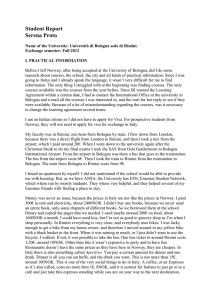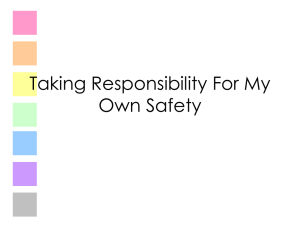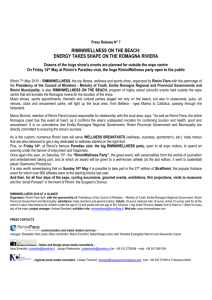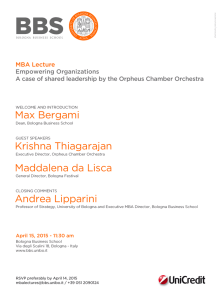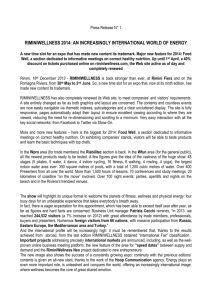Student Report Serena Proto
advertisement
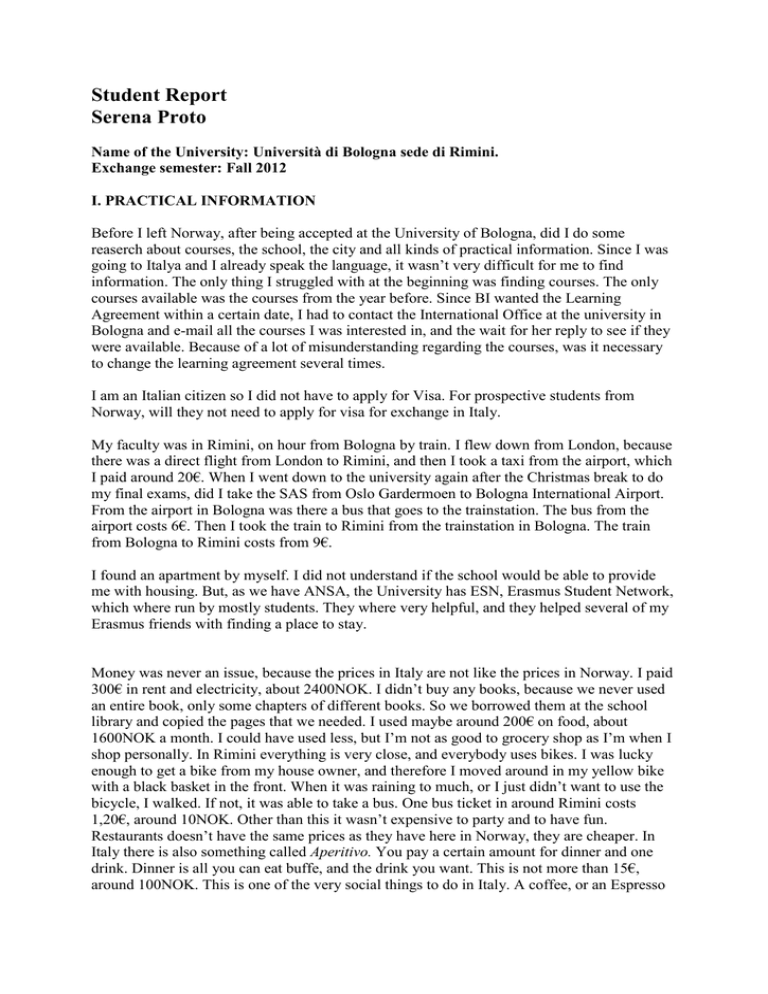
Student Report Serena Proto Name of the University: Università di Bologna sede di Rimini. Exchange semester: Fall 2012 I. PRACTICAL INFORMATION Before I left Norway, after being accepted at the University of Bologna, did I do some reaserch about courses, the school, the city and all kinds of practical information. Since I was going to Italya and I already speak the language, it wasn’t very difficult for me to find information. The only thing I struggled with at the beginning was finding courses. The only courses available was the courses from the year before. Since BI wanted the Learning Agreement within a certain date, I had to contact the International Office at the university in Bologna and e-mail all the courses I was interested in, and the wait for her reply to see if they were available. Because of a lot of misunderstanding regarding the courses, was it necessary to change the learning agreement several times. I am an Italian citizen so I did not have to apply for Visa. For prospective students from Norway, will they not need to apply for visa for exchange in Italy. My faculty was in Rimini, on hour from Bologna by train. I flew down from London, because there was a direct flight from London to Rimini, and then I took a taxi from the airport, which I paid around 20€. When I went down to the university again after the Christmas break to do my final exams, did I take the SAS from Oslo Gardermoen to Bologna International Airport. From the airport in Bologna was there a bus that goes to the trainstation. The bus from the airport costs 6€. Then I took the train to Rimini from the trainstation in Bologna. The train from Bologna to Rimini costs from 9€. I found an apartment by myself. I did not understand if the school would be able to provide me with housing. But, as we have ANSA, the University has ESN, Erasmus Student Network, which where run by mostly students. They where very helpful, and they helped several of my Erasmus friends with finding a place to stay. Money was never an issue, because the prices in Italy are not like the prices in Norway. I paid 300€ in rent and electricity, about 2400NOK. I didn’t buy any books, because we never used an entire book, only some chapters of different books. So we borrowed them at the school library and copied the pages that we needed. I used maybe around 200€ on food, about 1600NOK a month. I could have used less, but I’m not as good to grocery shop as I’m when I shop personally. In Rimini everything is very close, and everybody uses bikes. I was lucky enough to get a bike from my house owner, and therefore I moved around in my yellow bike with a black basket in the front. When it was raining to much, or I just didn’t want to use the bicycle, I walked. If not, it was able to take a bus. One bus ticket in around Rimini costs 1,20€, around 10NOK. Other than this it wasn’t expensive to party and to have fun. Restaurants doesn’t have the same prices as they have here in Norway, they are cheaper. In Italy there is also something called Aperitivo. You pay a certain amount for dinner and one drink. Dinner is all you can eat buffe, and the drink you want. This is not more than 15€, around 100NOK. This is one of the very social things to do in Italy. A coffee, or an Espresso as it’s also called, costs no more then 1€, 8NOK, and it is normal for Italians to just go in to a café and just take this espresso standing while you are on your way to the next destination. Italian culture is for me one of the best. The people are friendly, you can go in to a bar and everyone will talk and be nice to you. They do not make a big problem out of things, and they make everything very simple. I personally did not have any language problems since I am half Italian. My exchange friends didn’t have any problems either, only on few occasions. But in the bigger cities the English language isn’t a very big problem, especially north of Italy or in the cities which have a university. As the experience of the country goes, me and my friends rented a car and drove to Florence. It was very easy to move around by train. You could easily go to Bologna, Milan, Rome, Florence or any other city. I also took my friend to Sorrento, in Naples without any problems with the train. You can find trips in any price range, depending on the train you choose, if it’s a fast train or a local train, and the time you purchase your ticket. II. ABOUT THE SCHOOL The school was located in the center of Rimini. Very easy to find. It was several faculties, my faculty was the faculty of economics and it had two buildings. One where the lecture halls were and the other one with other lecture halls, professors offices, international office etc. I received all information I needed from the International Office. The international office coordinator was very helpful, and it was never a problem to drop by her office, call her, or email her with questions. I registered for the courses when I got down to Rimini. We had a welcome day the 18th September, where the international relations coordinator went through some practical information with us, also course registration. We could ad or drop courses all year around. The academic calander started the 24th of September and then you had a break in early November. The courses that gave you 6 credits or less, would end with this break. And then you could start another course. The courses with 10-12 credits would have a small exam within this break and then continue after the break, having a final exam in January. The courses that started after the break would also have a final exam in January. Academic calendar Arrival date: First day of the semester: Last day of classes: Examination period: Any special events/holidays: Other: 17th September 24th September 15th December January/February The introduction week started as a party week. We started the day of the Welcoming day with ESN, and continued out Saturday 21th September with a bigger party with every one of the international students. It was a different week from the one they have here at BI. It wasn’t events like here, but it was still very soscial. The only activity we had that involved our home countrys was the international dinner where every country cooked a specialty from their home. I baked muffins with a Swedish girl. The relationship between the nativ students and the exchange students were good. They were all very friendly. It seemed like the exchange stundets where very interesting for the native students. It was no gathering for the exchange students. All of the students went out to this place in the city center on Thursdays, and most of the exchange students came there on Thursdays. We were a nice group and we were together most of the time. Since Rimini isn’t a big city, it wasn’t many exchange students like you find in the bigger cities, Milan, Rome or Bologna. So it was easy for all of us to be together. III. ACADEMICS The teaching style was like in Norway. They used power points, black board, overheads etc. It wss theoretical class lectures, with some students papers that had to be handed in during the periode of the semester. We used books and online articles as reading material. We could also look into the professors Power Points for the notes. It is harder in Italy, they expect more from you. At BI you can always e-mail your professor and ask any questions you have conserning papers, exams etc, there it’s not that easy. The exams where based on the course material and on the lectures. It was therefore important to go to class. The course were evaluated by written exams at the end of the semester. In Italy you don’t have a student number as you have at BI, you have to write your name on the exam. It is therefore important to participate in class and let the professor see that you can. It is also the professor that grades you exam, so having a good relationship to your professor will definetly make it easier for you. The library was a couple of bloks from the faculty of economics. It wasn’t as big as the one at BI, but you could find what you needed and it was very quiet, so you would not be bothered by noise. Description of courses Please list below all the courses you took while on exchange. Your comments are useful for BI and for future exchange students, include information on the qacadmic level, challenges, relevance to your studies, if the course was practical/theoretical, any enrolment issues, etc. Course code & name Master/ Bachelor Exam form Strategic Management Master 1-hour written exam European Union Consumer Law Bachelor Presentation of written paper Tourism Marketing Bachelor 1-hour written exam Prerequisites Approved as Comments Theoretical, hard on the academic level. Theoretical, fun course with a good profesor Theoretical, not so difficult, but very fun. V. Final note – sum up the exchange period My exchange period was the best period of my life. It was great to experience another country, another University and meeting people all over the world. It was nice to see how universities in another country functioned. I liked how the exams only lasted one hour. They were still difficult, but you had less questions and more to write. Italians are very soscial and very nice people, not to mention welcoming, as a difference from Norwegian people. Even if I am from Italy, I’m not from Rimini, but the natives still made Rimini feel like home. After my exchange period I’ve become more certain that I do not want to do my master in Norway, and I do not want to work in Norway. I recommend every student at BI, and every student worldwide to go on exchange. It will only do a person good, and it makes you grow as a person. You have the chance to practice your English, get best friends from other nationalities, and learn the language from the country you are in. You will learn about other cultures, and learn about other people. I have deffinetly become more open to other countries after my exchange. Exchange is good, for everyone. It was the best time of my life, and if I could, I would do it again. (Comments can be used.)
